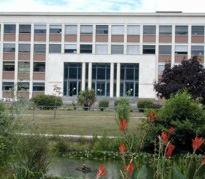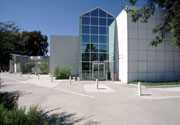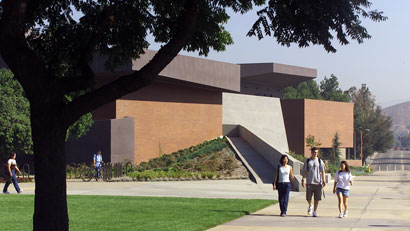Collaborations
Clock Tower
University of North Carolina
Dr. Andrew H Kaplan
College of Medicine
University of North Carolina at Chapel Hill
"My laboratory effort is focused on the ability of two RNA viruses (HIV and HCV) to evolve in the face of selection pressure. ... We are especially interested in the protease encoded by these two viruses and the ability of these enzymes to tolerate substitutions in critical residues while maintaining enzyme activity..."
University of Milan
Main Campus
Dr. Enrica Bosisio
College of Pharmacy
University of MIlan
"The main research area of our team includes the biological screening
for new antiplasmodial compunds and the studies of their mechanism of action,
with particular attention to natural products of vegetable origin...In
addition, our group is interested in the research of the compounds able
to inhibit matrix metalloproteases, rat adipocyte PDE 3 and human PDE 5
activities..."
Uppsala University
Main Entrance
Dr. Anders Hallberg
Organic Pharmaceutical Chemistry
Uppsala University
"The research interests of my group encompass a range of targets of
pharmaceutical relevance. One of our primary themes is to identify novel
and selective low molecular weight ligands for different targets. ..Lead
compounds are optimized using computer-aided techniques and are preferentially
synthesized using high-speed chemistry."
University of Bordeaux
Main Entrance
Dr. Stephane Quideau
Bordeaux l'Universite
Our research activities concern the chemistry and biological activity of natural products with a focus on phenolic and quinonoid compounds... Natural products will undoubtedly continue to be an important source of lead compounds for the development of novel preventive and curative chemotherapies against human diseases.
Dr. Robert McKenna
College of Medicine
University of Florida
We study the structure of biological molecules using the techniques of X-ray crystallography, cryo-electron microscopy, multi-sequence structural alignment, computer graphics and modelling... The result is a three- dimensional structural map of the biological molecule in the context of its function - an essential prerequisite for a full understanding of a biological system.
University of Florida
McKnight Brain Institute
University of Florida
Health Center
Dr. John B Dame
College of Veterinary Medicine
University of Florida
"My laboratory uses the tools of molecular biology to approach a broad
range of problems in parasitology including studies of parasite genome
organization, targets of rational drug design, novel diagnostic approaches
and rRNA based phylogenetics."
COLLABORATIONS
DUNN LABORATORY
Dr. Alexander Wlodawer
National Cancer Institute
U.S. National Institute of Health
"We are investigating the relationship between protein structure and function,
mainly by the technique of high-resolution X-ray diffraction. In the past
several years, our work has concentrated in three distinct areas ... crystallographic
studies of proteases, cytokines and cytokine receptors, proteins involved
in ribosome biogenesis and RNA interference."
Dr. Ralph A Bradshaw
Health Sciences
University of California, Irvine
Two major areas of investigation are in progress in our laboratory. In
the first, polypeptide growth factors ... and their receptors are being
examined with respect to structure and mechanism. The second block of studies
addresses the manner in which protein turnover in eukaryotic cells is regulated.
University of Californis, Irvine
Health Sciences
University of California, Riverside
Dr. Linda Walling
College of Natural and Agricultural Sciences
University of California, Riverside
"Two research projects dominate our current research initiatives.
First we are dissecting the mechanisms used to perceive phloem-feeding
whiteflies in squash, tomato and Arabidopsis. Second, we identified a peptidase
(leucine aminopeptidase) that responds to bacterial pathogens, wounding
and tissue-damaging herbivores..."
Dr. David Fidock
Albert Einstein College of Medicine
Yeshiva University
"A major focus of our group is to elucidate the molecular basis of
chloroquine resistance (CQR). By genetic linkage and positional cloning
we earlier identified the pfcrt gene and... we recently proved that mutations
in this gene, identified in drug resistant parasites from around the globe,
are sufficient to confer CQR to CQ-sensitive parasites."
University of Florida
UF Campus









